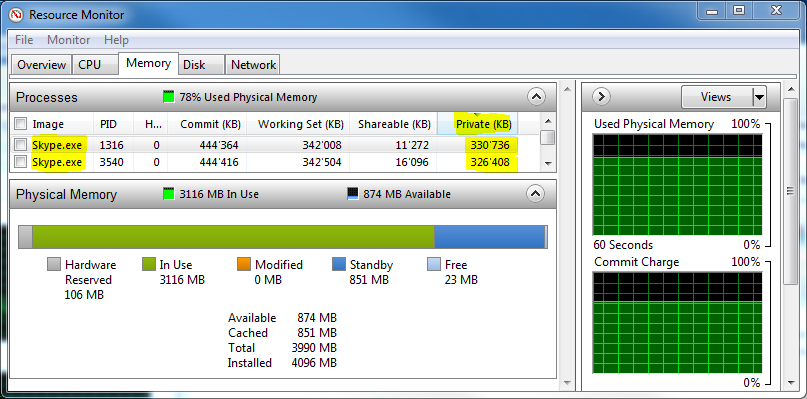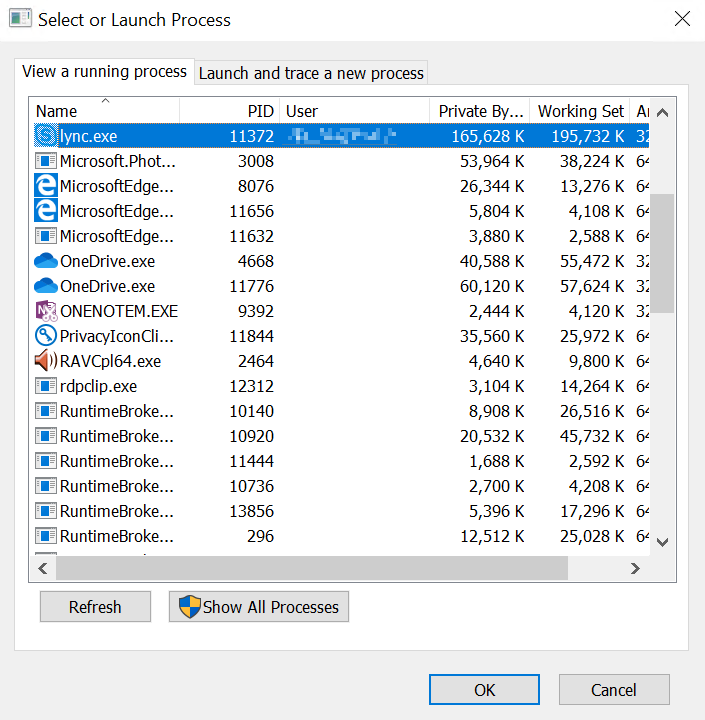Approved: Fortect
Sometimes your computer may display a message that a Skype 2012 memory leak is occurring. There can be several reasons for this error.

It looks like some of our users have encountered a known issue with Skype Memory Leak 2012. This situation occurs for several reasons. We will talk about this below. A memory leak is most likely a situation where a vendor allocates heap and then loses all references to the memory so that it cannot be easily accessed or deallocated. The specified memory remains allocated and is therefore rarely returned when the program requests additional memory.
Nobody answered for a while. To talk, just ask for a new main topic.
Question:
About 30 minutes ago, I opened the Activity Monitor because everything was very slow and / or noticed that Skype was taking up a lot more than 16GB of disk space. So I quit skype.
I opened Activity and Monitoring, I opened Skype again â € • Started with 160 MB.
I hid skype, cmd h, but every 5 seconds skype was hidden and memory usage increased by about 20MB.
The last exact hour, after about 30 minutes, when your friend stopped hiding, memory usage increased to 5.56
Go ahead! I’m not one hundred percent, but this only happens when burning firewood from Skype from the main page (home screen), where ads are displayed.
Skype version: 7.52 (597)
Approved: Fortect
Fortect is the world's most popular and effective PC repair tool. It is trusted by millions of people to keep their systems running fast, smooth, and error-free. With its simple user interface and powerful scanning engine, Fortect quickly finds and fixes a broad range of Windows problems - from system instability and security issues to memory management and performance bottlenecks.

MacOS version: 10.13.3 (17D47)
Mac mini (Late 2012) OS X Mavericks (10.9.5)
Posted in
Question:
Mac mini (Late 2012) OS X Mavericks (10.9.5)
Posted in
After about 30 minutes I opened the activity monitor because everything was already very slow and noticed that Skype was taking over 16GB of free space. So I quit Skype.
I opened Activity Monitor and reopened Skype … It started at 160MB.
I hid skype, cmd d, but every 5 minutes skype was under control and memory usage increased by 20 megabytes.
The last time, about 30 minutes later, when it stopped accessing, the memory usage jumped to 5.56 GB!
I’m not sure, but this only happens after exiting Skype from the main home screen (home screen) where the ad campaign is running.
Which Windows Program?
I’m just giving a simplified view of the Windows Store. Windows memory is also managed by expensive methods (in computer bikes and resources) called allocation and deallocation. When a program requires Windows memory, the product prompts the product to allocate it. If the memory was still ready, the program asks Windows to free it. Windows has several processes that go through the use of memory management requirements.
When a specific request is made, Windows checks the RAM that has already been transferred there, butIt’s working, the process doesn’t try. Windows will check if the block of memory is large enough for use. Therefore, if the system takes advantage of this, it clings to it and continues on its way. Otherwise, the reserved memory is checked. If there is a large enough block of reserved memory, it is checked (called “pages” in the sections defined by the operating system) and the stored variable is saved. almost ready. Now the memory is allocated and our company just added more memory to the exe.
What if there is no acceptable registration process for the application? The operating system tries – if possible – to reserve more memory. This is the difference between the average 32-bit 64-bit architecture and the architecture. 32-bit means a maximum of 4 GB of memory can be used. Indeed, a kind of 32-bit register can address a maximum of iv GB (a bit can only contain an absolute binary number with 1 or 0. 8 bits means 2 32 is the top-level address). On a 32-bit architecture, approximately 2 GB of this internallyth memory is constantly allocated to the process itself. The rest are used by the operating system to look at shared DLLs, manage kernel mode objects, etc. A 64-bit system with two 64-bit registers can certainly handle 64-bit, or about 18 exabytes. However, Windows artificially limits the amount of available memory from 2 terabytes (TB) to several terabytes (TB), depending on the version used with Windows.
Once memory has been allocated, it will be checked and then used as before. An assertion is pretty much the opposite – unless you factor in a few small but important things.
First, Windows never cleans up internal memory unnecessarily. If memory has always been freed, it is marked as free for the Windows memory card transfer. Whatever he formulated stays there until the mapping overwrites it. Second, Windows rarely frees memory unnecessarily. As I mentioned earlier, memory operations are very resource intensive. When a program requires previously allocated memory, Windows indicates that it canIt will need this memory again, and will suspend garbage collection until absolutely unavoidable. After all, the window of the warehouse does not “leak”. This means that Windows shared memory never “aggregates”, and completely free blocks of memory are never “moved” together to create large blocks of free memory. (These specifications are all grouped into one specific garbage collection category. The .NET Framework is known to have garbage collection capabilities. However, Skype for Business is one native or non-.NET application.)

Skype for bi. The system processes objects of various shapes every second. He must do this in order to be exactly the wonderful tool that we need. We ask them to delete contacts, manage calendars (appointments) and instant campaigns with our friends, family members and colleagues, even talk to them on voice TV, share tables or windows, etc. Well, to quote the late great Robert Heinlein about others : “There are no free meals.”
Management of the same a large number of objects of this type of various sizes and is often the result of allocating and clearing obstacles for storing data of different sizes. Over time, this sale sometimes results in severe memory fragmentation, which speeds up Skype for Business memory consumption. A
An example can illustrate this well. Let’s say Skype (or the native program itself) assigns 64 objects numbered from 1 to 64, each 4 KB in size:
Fig. 6.64 Objects 4 with KB of memory each
This will allocate space and allocate 256 KB. It is assumed that the program does not need this. There are even objects, besides, he frees them:
Fig. 7. If you free all the even numbered objects, the 128KB hard disk space will not be loaded!
If you look at a zoomed-in image attached to shared memory (using VMMap or the same tool), you will see that it has fixed columns (maybe in the Lots of stuff, but it hangs depending on location ) the program requested this memory) is 128 KB less, and the extended free regionPart has 128. For the owner of the task, the program has only 128 KB for Memory. Next
Suppose our program has a single 8KB object that needs to be backed up. This should be fun. Anything beyond 128K is available. However, if you try to store this particular 8K object, a new memory allocation will be created instead of being saved.
Speed up your computer's performance now with this simple download.


